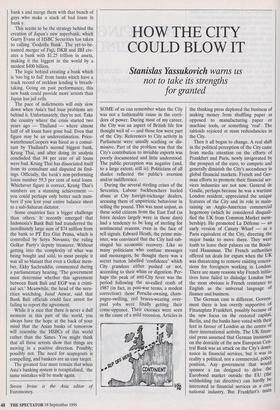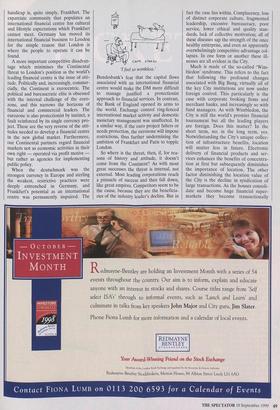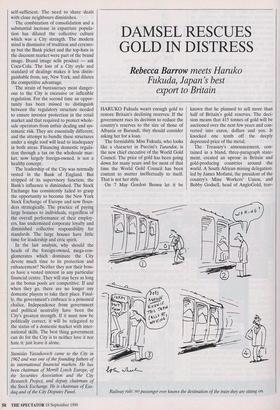HOW THE CITY COULD BLOW IT
Stanislas Yassukovich warns us
not to take its strengths for granted
SOME of us can remember when the City was not a fashionable cause in the con-i- dors of power. During most of my career, the City was an aspect of British life few thought well of — and those few were part of the City. References to City activity in Parliament were usually scathing or dis- missive. Part of the problem was that the City's contribution to invisible exports was poorly documented and little understood. The public perception was negative (and, to a large extent, still is). Politicians of all shades reflected the public's aversion and/or indifference.
During the several sterling crises of the Seventies, Labour backbenchers hurled abuse at City foreign-exchange dealers, accusing them of unpatriotic behaviour in selling the pound. This was most unjust, as these solid citizens from the East End (as forex dealers largely were in those days) had a tendency to be long of sterling for sentimental reasons, even in the face of sell signals. Edward Heath, the prime min- ister, was convinced that the City had sab- otaged his economic recovery. Like so many politicians who confuse messages and messengers, he thought there was a secret button labelled 'confidence' which City grandees either pushed or not, according to their whim or digestion. Per- haps the peak of anti-City fever was the period following the so-called crash of 1987 (in fact, in post-war terms, a modest correction): those Porsche-owning, cham- pagne-swilling, red braces-wearing over- paid yobs were finally getting their come-uppance. Their excesses were seen as the cause of a mild recession. Articles in the thinking press deplored the business of making money from shuffling paper as opposed to manufacturing paper or machine tools, or something 'real'. The tabloids rejoiced at mass redundancies in the City.
Then it all began to change. A real shift in the political perception of the City came from media attention on the efforts of Frankfurt and Paris, newly invigorated by the prospect of the euro, to compete and generally diminish the City's ascendancy in global financial markets. French and Ger- man efforts to promote their financial ser- vices industries are not new. General de Gaulle, perhaps because he was a wartime London resident, appreciated the unique features of the City and its role in main- taining an Anglo-American commercial hegemony (which he considered disquali- fied the UK from Common Market mem- bership). He promoted La Defense — an early version of Canary Wharf — as a Paris equivalent of the City, directing the major banks to move there. They were loath to leave their palaces on the Boule- vard Haussman. The French authorities offered tax deals for expats when the UK was threatening to remove existing conces- sions for foreigners working in London. There are many reasons why French initia- tives have failed to dislodge London but the most obvious is French resistance to English as the universal language of finance and business.
The German case is different. Govern- ment there is less overtly supportive of Finanzplatz Frankfurt, possibly because of the new focus on the restored capital, Berlin, and the banks have voted with their feet in favour of London as the centre of their international activity. The UK finan- cial press assumed that German insistence on the domicile of the new European Cen- tral Bank was an attack on the City's domi- nance in financial services, but it was .in reality a political, not a commercial, pelleY position. Any government that would sponsor a tax designed to drive the Eurobond market outside the EU (the withholding tax directive) can hardly be interested in financial services as a core national industry. But Frankfurt's main handicap is, quite simply, Frankfurt. The expatriate community that populates an international financial centre has cultural and lifestyle expectations which Frankfurt cannot meet. Germany has moved its international financial business to London for the simple reason that London is where the people to operate it can be found.
A more important competitive disadvan- tage which minimises the Continental threat to London's position as the world's leading financial centre is the issue of atti- tude. Politically and, increasingly, commer- cially, the Continent is eurocentric. The political and bureaucratic elite is obsessed with the internal challenge of the euro- zone, and this narrows the horizons of financial and commercial leaders. The eurozone is also protectionist by instinct, a fault reinforced by its single currency pro- ject. These are the very reverse of the atti- tudes needed to develop a financial centre in the new global market. Furthermore, our Continental partners regard financial markets not as economic activities in their own right — operated via profit motive but rather as agencies for implementing public policy. When the deutschmark was the strongest currency in Europe and sterling the weakest, restrictive practices were deeply entrenched in Germany, and Frankfurt's potential as an international centre was permanently impaired. The 7 feel so worthless.'
Bundesbank's fear that the capital flows associated with an international financial centre would make the DM more difficult to manage justified a protectionist approach to financial services. In contrast, the Bank of England opened its arms to the world. Exchange control ring-fenced international market activity and domestic monetary management was unaffected. In a similar way, if the euro project falters or needs protection, the eurozone will impose restrictions, thus further undermining the ambition of Frankfurt and Paris to topple London.
So where is the threat, then, if, for rea- sons of history and attitude, it doesn't come from the Continent? As with most great successes the threat is internal, not external. Most leading corporations reach a pinnacle of success and then fall down, like great empires. Competitors seem to be the cause, because they are the beneficia- ries of the industry leader's decline. But in fact the case lies within. Complacency, loss of distinct corporate culture, fragmented leadership, excessive bureaucracy, poor service, lower ethical and quality stan- dards, lack of collective motivation; all of these diseases sap the strength of the once healthy enterprise, and even an apparently overwhelmingly competitive advantage col- lapses. In one form or another these ill- nesses are all evident in the City.
Much is made of the so-called 'Wim- bledon' syndrome. This refers to the fact that following the profound changes associated with Big Bang, virtually all of the key City institutions are now under foreign control. This particularly is the case with corporate broking firms and merchant banks, and increasingly so with fund managers. As with Wimbledon, the City is still the world's premier financial tournament but all the leading players are foreign. Does this matter? In the short term, no; in the long term, yes. Notwithstanding the City's unique collec- tion of infrastructure benefits, location will matter less in future. Electronic delivery of financial products and ser- vices enhances the benefits of concentra- tion at first but subsequently diminishes the importance of location. The other factor diminishing the location value of the City is the decline in syndication of large transactions. As the houses consoli- date and become huge financial super- markets they become transactionally self-sufficient. The need to share deals with close neighbours diminishes.
The combination of consolidation and a substantial increase in expatriate popula- tion has diluted the collective culture which was a City strength. The modern mind is dismissive of tradition and ceremo- ny but the Bank picket and the top-hats in the discount market were part of the brand image. Brand image sells product — ask Coca-Cola. The loss of a City style and standard of dealings makes it less distin- guishable from, say, New York, and dilutes the competitive advantage.
The strain of bureaucracy most danger- ous to the City is excessive or inflexible regulation. For the second time an oppor- tunity has been missed to distinguish between the regulatory structure needed to ensure investor protection in the retail market and that required to protect whole- sale operators from unfair dealing and sys- tematic risk. They are essentially different, and the attempt to bundle these structures under a single roof will lead to inadequacy in both areas. Financing domestic regula- tion through a tax on the wholesale mar- ket, now largely foreign-owned, is not a healthy concept.
The leadership of the City was normally vested in the Bank of England. But stripped of its supervisory function, the Bank's influence is diminished. The Stock Exchange has consistently failed to grasp the opportunity to become the New York Stock Exchange of Europe and now floun- ders strategically. The practice of paying large bonuses to individuals, regardless of the overall performance of their employ- ers, has undermined corporate loyalty and diminished collective responsibility for standards. The large houses have little time for leadership and civic spirit.
In the last analysis, why should the heads of the foreign-owned, mega-con- glomerates which dominate the City devote much time to its protection and enhancement? Neither they nor their boss- es have a vested interest in any particular financial centre. They will stay here as long as the bonus pools are competitive. If and when they go, there are no longer any domestic players to take their place. Final- ly, the government's embrace is a poisoned chalice. Independence from government and political neutrality have been the City's greatest strength. If it must now be politically correct, it will be relegated to the status of a domestic market with inter- national skills. The best thing government can do for the City is to neither love it nor hate it: just leave it alone.
Stanislas Yassukovich came to the City in 1962 and was one of the founding fathers of its international financial markets. He has been chairman of Merrill Lynch Europe, of the Securities Association and the City Research Project, and deputy chairman of the Stock Exchange. He is chairman of Eas- daq and of the City Disputes Panel.




























































































 Previous page
Previous page